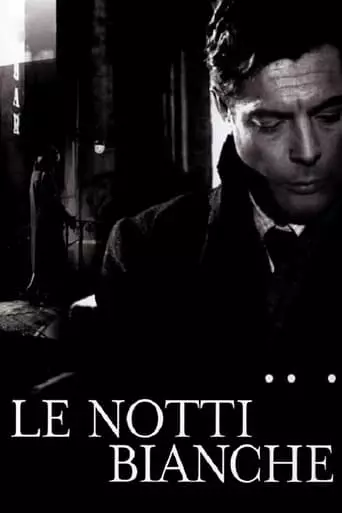A middle-aged man meets a young woman who is waiting on a canal bridge for her lover’s return.
Le Notti Bianche (1957), directed by Luchino Visconti, is an evocative romantic drama adapted from Fyodor Dostoevsky’s short story White Nights. Set in the Italian city of Livorno, the film follows Mario (Marcello Mastroianni), a young man new to the city, who encounters Natalia (Maria Schell) on a bridge over a canal. Natalia is waiting for a man who promised to return after a year, and Mario becomes her confidant during this period. Over four nights, they share their dreams and sorrows, leading to a deep emotional connection. However, when the man Natalia has been waiting for returns, she chooses to reunite with him, leaving Mario heartbroken. The film explores themes of unrequited love, loneliness, and the transient nature of human connections.
Main Themes in Le Notti Bianche
- Unrequited Love and Longing: The film poignantly portrays the pain of loving someone who cannot reciprocate those feelings. Mario’s deep affection for Natalia, who remains devoted to another, highlights the emotional turmoil of unreciprocated love.
- Loneliness and Isolation: Both protagonists grapple with profound loneliness. Mario, a newcomer to the city, and Natalia, who waits for a lover who may never return, find solace in each other’s company, albeit temporarily.
- The Ephemeral Nature of Human Connections: The transient relationship between Mario and Natalia underscores the fleeting nature of human bonds. Their brief yet intense connection serves as a meditation on the impermanence of relationships and the passage of time.
- Idealism vs. Reality: The film contrasts the characters’ idealistic dreams with the harsh realities they face. Natalia’s unwavering hope for her lover’s return and Mario’s romanticized view of their relationship clash with the reality of their situations, leading to inevitable disappointment.
Impact of Le Notti Bianche (1957)
Upon its release, Le Notti Bianche received critical acclaim for its sensitive portrayal of human emotions and its artistic cinematography. Visconti’s adaptation of Dostoevsky’s work brought a new depth to Italian cinema, blending literary richness with visual poetry. The film’s exploration of universal themes resonated with audiences worldwide, solidifying its status as a classic in romantic cinema.
7 Reasons to Watch Le Notti Bianche (1957)
- Masterful Direction by Luchino Visconti: Visconti’s direction brings a poetic and melancholic quality to the film, capturing the essence of Dostoevsky’s narrative while infusing it with Italian sensibilities. His meticulous attention to detail and atmosphere creates a deeply immersive experience.
- Stellar Performances by Marcello Mastroianni and Maria Schell: Mastroianni and Schell deliver compelling performances, portraying their characters’ inner turmoil and longing with subtlety and depth. Their chemistry brings authenticity to the film’s emotional core.
- Cinematography and Visual Aesthetics: The film’s cinematography is a visual treat, with its evocative use of light and shadow enhancing the dreamlike quality of the narrative. The depiction of the Italian cityscape, especially the canal and bridge, adds to the film’s atmospheric charm.
- Exploration of Universal Themes: Le Notti Bianche delves into timeless themes such as love, loneliness, and the human condition, making it relatable to a wide audience. Its exploration of the complexities of human emotions offers profound insights into the nature of relationships.
- Emotional Depth and Resonance: The film’s portrayal of unrequited love and the fleeting nature of human connections evokes a deep emotional response. Its poignant narrative lingers with the viewer, prompting reflection on personal experiences and relationships.
- Cultural and Historical Significance: As an adaptation of a Dostoevsky work, the film offers a glimpse into Russian literature through the lens of Italian cinema. This cross-cultural adaptation enriches the viewer’s understanding of both literary and cinematic traditions.
- Timeless Romantic Storytelling: The film’s narrative is a classic tale of love and loss, told with elegance and sincerity. Its enduring appeal lies in its ability to convey the universal experience of love’s joys and sorrows.
How Will You Feel After Watching Le Notti Bianche (1957)?
After watching Le Notti Bianche, you will likely experience a profound sense of empathy and introspection. The film’s exploration of unrequited love and human connection may evoke feelings of melancholy and nostalgia. The poignant performances and evocative cinematography will leave a lasting impression, prompting you to reflect on the transient nature of relationships and the complexities of the human heart. The film’s bittersweet conclusion may stir a sense of longing and contemplation, resonating with your own experiences of love and loss. Overall, Le Notti Bianche offers a deeply emotional and thought-provoking cinematic experience that lingers long after the credits roll.

